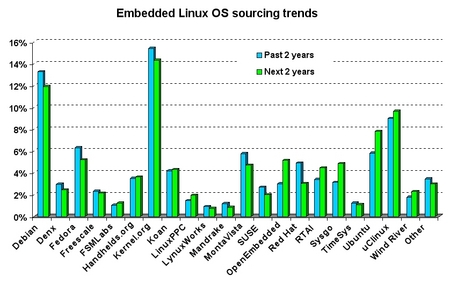Why device developers prefer Debian
Apr 30, 2007 — by LinuxDevices Staff — from the LinuxDevices Archive — 3 viewsLinuxDevices.com's survey results consistently show Debian to be the most popular distribution among device developers. For example, our 2007 survey indicated that Debian was used in device-related projects by 13 percent of the survey's 932 participants, roughly double the score of MontaVista, the most… popular strictly-embedded distribution.
What sources of Linux were/will be in your (company's) embedded designs?
(Click to enlarge)
digg this story |
In addition to Debian's 13 percent score, Ubuntu, which is based on Debian packages, jumped to 6 percent this year, its first year in our survey. In contrast, Red Hat, achieved a 5 percent score and Fedora came in at 6 percent, while SUSE scored just 2 percent. The complete results and analysis are here.
Why do device developers prefer Debian?
Here are what I believe are the top reasons:
- All the latest packages –Ironically, Debian is sometimes faulted for infrequent stable releases. But developers don't care so much about the kind of “stability” that the stable branch buys you — desktop integration and UI fit and finish. They all run the “unstable” branch, and generally apt-get important packages weeks, days, or hours after they are released upstream — and months before they appear in packaged distributions.
- It's comprehensive — Last time I checked, Debian had more than 14,000 packages. It's rare to find an open source software package that is not maintained in Debian. The average maintainer's age is about 23. Learning to build and package software is a great introduction to open source programming.
- It's never going out of business — Debian is not in any way affiliated with any commercial venture, and thus is pretty much not going to be the next BeOS.
- It's convenient — Hm, I wonder if there's an open source software package that does xyz. Apt-cache search xyz. Dpkg -l '*xyz*'. Apt-cache show xyz-utils. Apt-get install xyz-utils. It's as simple as that. And probably even simpler with aptitude, which is what we're all supposed to be using by now, you know.
- 11 architectures — Actually, I think there are more architectures than this, but only 11 appear to have installation manuals (those incredibly prolix things! Someone should take a machete to them). Developers (especially device developers) like lots of architectures, since they all have their strengths (x86 for complex multi-tasking UIs, ARM for low power, MIPS and PowerPC for extensibility, etc).
- It's infinitely malleable — When you install Debian, you can opt for one of the “tasksel” packages, such as “desktop” or “print server,” etc., etc. However, you don't have to. You can still very easily install only the most minimal of components, and then simply add what you need, as you need it. After a week or so, you've got everything you need, and nothing you don't — a great strategy for increasing security and getting the most from your system.
- You're not stuck inside Debian — If you have to install RPMs, you can convert them into DEBs using the alien scripts. If you want to build stuff from source, you can “hold” packages so your custom-built stuff won't get clobbered by the next system-wide upgrade.
- Easy system maintenance, even between major releases — With each new release, instead of downloading a CD and wiping out your root filesystem, just apt-get dist-upgrade. And, you can sync up to the latest and greatest versions of everything as often as you like.
- Support of other Debian users — Debian users tend toward omniscience, or at least fiercely competitive peer review, even of support advice. The #debian channel on freenode is a great place to observe this in action, and get help solving any question you like (as long as it's actually a Debian question).
 About the author: Henry Kingman has been Senior Editor of LinuxDevices.com since August of 2003. He can be reached at Henry at LinuxDevices.com.
About the author: Henry Kingman has been Senior Editor of LinuxDevices.com since August of 2003. He can be reached at Henry at LinuxDevices.com.
This article was originally published on LinuxDevices.com and has been donated to the open source community by QuinStreet Inc. Please visit LinuxToday.com for up-to-date news and articles about Linux and open source.
